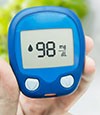Diabetes 101
Diabetes—sure it’s a challenge, but it’s manageable. And, TeamingUp can help!
As you may already know, diabetes is a condition in which you have higher than normal levels of sugar in your blood. To better understand and manage your diabetes, it’s important to understand how the body normally manages blood sugar.
Simply put, blood sugar comes from two main sources: the carbohydrates in the foods you eat, and the breakdown of sugar stored in your liver.
Let’s focus on the 2 key hormones your body produces to help control blood sugar during the day:

The role of insulin
The role of insulin
Insulin helps move sugar from your blood into your cells where it’s used as fuel for energy, or stored in your liver and muscles for your body to use later. Think of insulin as a “key” that unlocks your cells so they can receive the sugar from your bloodstream.
When does this happen? When sugar levels rise in your blood, the pancreas (an organ located behind the stomach) produces and releases insulin into your bloodstream.
When you have diabetes, your body doesn’t produce enough insulin or doesn’t use it properly, and your blood sugar levels may rise. It’s important to note that Insulin levels are affected by another hormone called GLP-1. Read on to discover all the ways GLP-1 regulates blood sugar.

The role of Glucagon-like peptide 1 (GLP-1)
The role of Glucagon-like peptide 1 (GLP-1)
GLP-1 helps regulate your blood sugar levels in 3 key ways:
When does this happen? After you eat GLP-1 is released by the small intestine to slow down the rate at which food leaves your stomach. When your blood sugar is high, GLP-1 acts in the pancreas to increase the release of insulin.
See what happens in your body
See how blood sugar moves throughout your body, how your body works to manage blood sugar and how your diabetes can change over time.

The Ins & Outs Of Insulin
Do you know insulin inside out?
TAKE THE QUIZ >>




